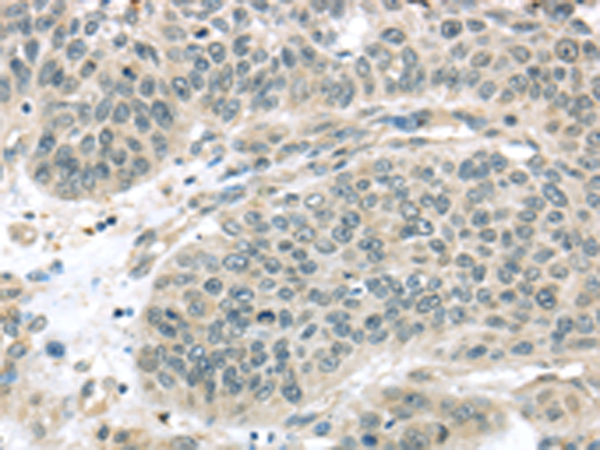

| WB | 咨询技术 | Human,Mouse,Rat |
| IF | 咨询技术 | Human,Mouse,Rat |
| IHC | 1/25-1/100 | Human,Mouse,Rat |
| ICC | 技术咨询 | Human,Mouse,Rat |
| FCM | 咨询技术 | Human,Mouse,Rat |
| Elisa | 1/2000-1/5000 | Human,Mouse,Rat |
| Aliases | PP238; CGI-36 |
| WB Predicted band size | 63 kDa |
| Host/Isotype | Rabbit IgG |
| Antibody Type | Primary antibody |
| Storage | Store at 4°C short term. Aliquot and store at -20°C long term. Avoid freeze/thaw cycles. |
| Species Reactivity | Human, Mouse, Rat |
| Immunogen | Fusion protein of human THAP4 |
| Formulation | Purified antibody in PBS with 0.05% sodium azide and 50% glycerol. |
+ +
以下是关于THAP4抗体的3篇参考文献示例(内容为模拟概括,具体文献需根据实际检索验证):
---
1. **文献名称**: **"Development of a Monoclonal Antibody Specific to THAP4 for Epigenetic Studies"**
**作者**: Smith A et al.
**摘要**: 描述了针对人THAP4蛋白的单克隆抗体的开发,通过重组蛋白免疫小鼠获得抗体,验证了其在Western blot和免疫沉淀中的特异性,并应用于染色质结合实验中研究THAP4的表观遗传调控作用。
---
2. **文献名称**: **"THAP4 Antibody Validation in Neural Stem Cell Differentiation"**
**作者**: Lee B et al.
**摘要**: 本文验证了一种商业THAP4抗体在神经干细胞模型中的应用,通过CRISPR敲除实验证实抗体特异性,发现THAP4在分化过程中表达上调,提示其可能参与神经发育调控。
---
3. **文献名称**: **"THAP4 Interaction with p53: A Study Using Custom Polyclonal Antibodies"**
**作者**: Gupta R et al.
**摘要**: 利用自制的THAP4多克隆抗体(抗原为C端肽段),通过免疫共沉淀和质谱分析揭示了THAP4与p53的相互作用,为研究其在DNA损伤应答中的功能提供了工具。
---
**注意事项**:
- 实际文献需通过PubMed、Google Scholar等平台以关键词“THAP4 antibody”或“anti-THAP4”检索。
- 部分研究可能未在摘要中明确提及抗体细节,需查阅方法学部分。
- 抗体供应商(如Abcam、CST)的技术手册可能引用相关文献,可参考其官网资料。
建议结合具体研究需求进一步筛选高影响力或近期发表的文献。
The THAP4 antibody is a tool used to detect THAP4 (THAP domain-containing protein 4), a member of the THAP family of proteins characterized by a conserved N-terminal THAP domain, a zinc-coordinating motif involved in DNA binding. THAP4 is encoded by the *THAP4* gene in humans and is implicated in transcriptional regulation, chromatin remodeling, and cellular processes such as proliferation and apoptosis. Though less studied than other THAP proteins (e.g., THAP1 or THAP9), THAP4 is suggested to function as a transcription factor or epigenetic modulator, potentially interacting with protein complexes to regulate gene expression. Its biological roles remain under investigation, with possible links to cancer, neurodevelopment, and metabolic pathways.
THAP4 antibodies are primarily utilized in research to study protein expression, localization, and interactions via techniques like Western blotting, immunohistochemistry, and immunofluorescence. These antibodies are critical for validating THAP4 expression in cell lines or tissues, assessing its role in disease models, or exploring its molecular mechanisms. Commercial THAP4 antibodies are typically raised against specific epitopes, often in rabbits or mice, and require validation for specificity and sensitivity. Researchers should verify antibody performance using knockout controls or siRNA-mediated knockdown to minimize off-target signals. Current challenges include limited data on THAP4’s precise physiological functions and a scarcity of standardized reagents, highlighting the need for further studies to elucidate its contributions to health and disease.
×